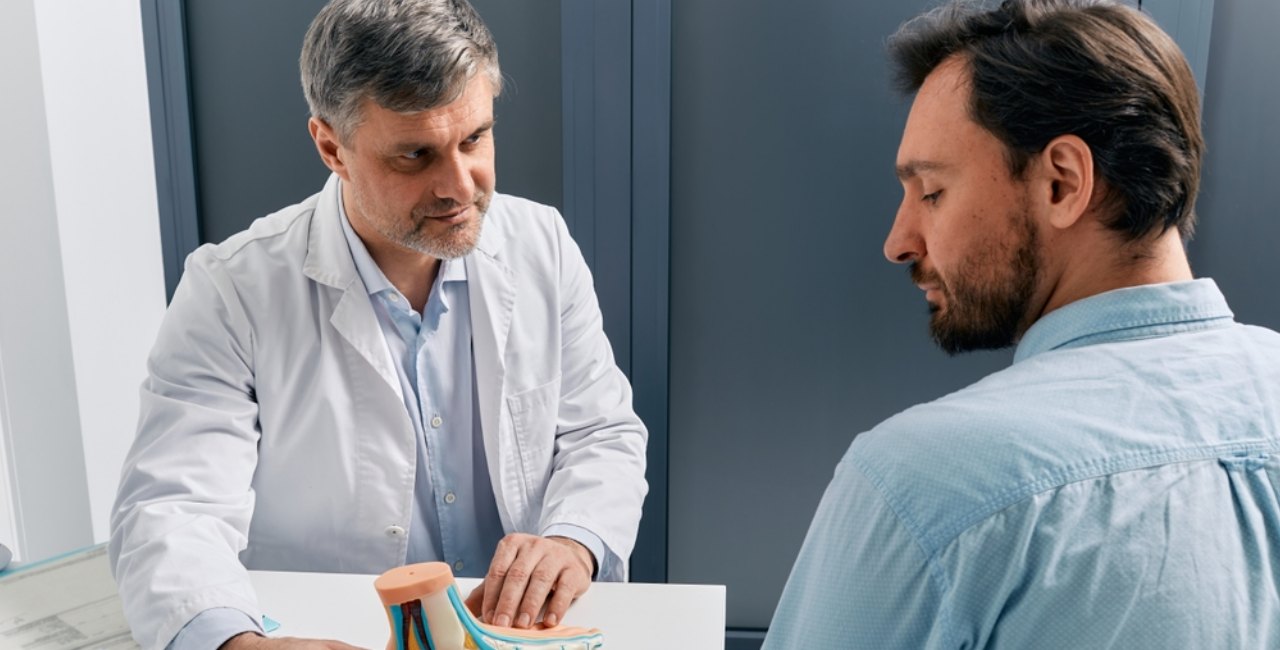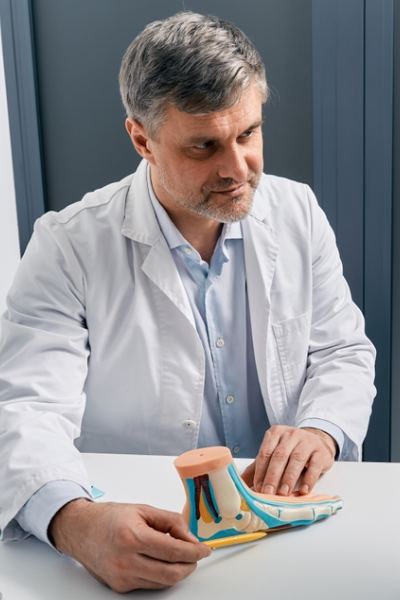Plantar Fasciitis Treatment in Scottsdale, AZ
If you’re experiencing heel pain or discomfort from plantar fasciitis, Dr. Nathan Plaskey at Arizona Foot and Ankle Physicians is here to help. Whether it’s conservative measures like physical therapy and custom orthotics or advanced procedures for more severe cases, you can trust that you’re in skilled hands. We are committed to providing comprehensive care that addresses the root causes of your pain, ensuring effective and lasting relief. For more information, contact us or request an appointment online. We are conveniently located at 11390 E. Via Linda, Ste 102, Scottsdale, AZ 85259.


Table of Contents:
What is plantar fasciitis, and what causes it?
How can I relieve plantar fasciitis pain at home?
What are the best treatment options for plantar fasciitis?
How long does it take to heal from plantar fasciitis?
Plantar fasciitis is one of the most frequently treated conditions by Arizona Foot and Ankle Physicians. Our skilled podiatrists specialize in diagnosing and managing this common inflammatory condition, which typically presents as a sharp, stabbing pain at the bottom of the foot near the heel.
The plantar fascia is a thick band of connective tissue extending from the heel bone (calcaneus) to the toes, providing critical support to the arch and absorbing shock during activities like walking, running, or prolonged standing. We understand how debilitating plantar fasciitis can be, particularly when pain is most intense with the first steps in the morning or after extended periods of rest.
Our experienced team highlights the importance of recognizing and addressing risk factors early. Excessive strain on the plantar fascia, repetitive stress activities (such as running, dancing, or prolonged standing), inadequate footwear support, flat feet, high arches, obesity, aging, or tight Achilles tendons and calf muscles can all increase your susceptibility to plantar fasciitis. Sudden changes in your physical activity levels or exercise routines can also lead to inflammation and discomfort.
At Arizona Foot and Ankle Physicians, we prioritize patient education and prevention strategies. By understanding the underlying causes and risk factors, our patients can take proactive measures and seek timely treatment to effectively manage symptoms and regain their mobility and comfort.
Plantar fasciitis is one of the most common conditions we treat at Arizona Foot and Ankle Physicians. This condition is often characterized by heel pain resulting from inflammation of the plantar fascia—a strong, fibrous band of tissue running along the bottom of your foot. Fortunately, our podiatrists recommend several effective ways you can relieve plantar fasciitis pain at home.
Regular stretching exercises can notably improve the flexibility, strength, and overall health of your feet. We encourage patients to practice gentle stretches daily, including calf stretches and plantar fascia-specific stretching exercises. Rolling your foot over a tennis ball or small foam roller is another excellent way to gently massage and stretch the plantar fascia, alleviating pain and tension.
Applying ice to your feet is often helpful in reducing inflammation and managing pain. Place an ice pack wrapped in a towel over your heel and arch area for about 15 to 20 minutes, several times a day. Another effective method is rolling a frozen water bottle under your foot, providing simultaneous cold therapy and massage.
Choosing the right footwear is essential for managing and preventing plantar fasciitis pain. Our podiatrists recommend wearing supportive shoes that provide proper arch support, cushioning, and shock absorption. Avoid flat shoes, sandals without support, or walking barefoot on hard surfaces, as these can aggravate your symptoms.
Over-the-counter anti-inflammatory medications, such as ibuprofen or naproxen, can temporarily relieve pain and inflammation. However, before relying on these medications regularly or long-term, we encourage you to consult with one of our experienced podiatrists to ensure they are safe and appropriate for your specific condition.
Plantar fasciitis is one of the most common conditions treated by our specialists at Arizona Foot and Ankle Physicians. It is characterized by inflammation and pain in the plantar fascia, a thick band of tissue connecting your heel bone to your toes. Our podiatrists provide comprehensive, personalized treatment plans designed to relieve pain, reduce inflammation, and promote long-term healing.
Initial treatment strategies often involve rest and activity modifications. Our team will help you identify activities that may aggravate your plantar fascia, such as prolonged standing, running, or high-impact exercises, and recommend appropriate adjustments. Additionally, our podiatrists will guide you in selecting proper footwear featuring adequate arch support and cushioning, which is essential for managing symptoms effectively.
We emphasize patient education and proactive treatment, including stretching and strengthening exercises tailored specifically for plantar fasciitis. Our providers will demonstrate gentle stretches targeting the plantar fascia, calf muscles, and Achilles tendon, which can significantly improve flexibility, alleviate discomfort, and support recovery over time.
We also recommend icing or cold therapy, typically applying ice packs to the painful area for 15–20 minutes several times daily. This simple yet effective method can significantly reduce inflammation and acute pain.
Physical therapy is often a crucial component of our comprehensive approach. Our providers collaborate with skilled physical therapists who utilize targeted exercises, manual therapy techniques, ultrasound, and electrical stimulation to enhance healing and symptom relief.
Additionally, we may prescribe night splints or custom orthotic devices to maintain the plantar fascia and Achilles tendon in a gently stretched position overnight. This strategy can effectively alleviate the common symptoms of morning pain associated with plantar fasciitis.
Our podiatrists may recommend non-steroidal anti-inflammatory drugs (NSAIDs), such as ibuprofen or naproxen, to manage pain and inflammation temporarily. However, these medications should always be used under medical supervision to minimize potential side effects.
When conservative treatments do not adequately relieve symptoms, Arizona Foot and Ankle Physicians offers advanced interventions, including corticosteroid injections. These injections deliver medication directly to the affected area to quickly reduce inflammation and discomfort. Our podiatrists administer these injections with caution to prevent potential weakening of the plantar fascia tissue.
Healing from plantar fasciitis is highly individualized, and at Arizona Foot and Ankle Physicians, we understand the importance of personalized, compassionate care tailored to each patient’s unique condition. The recovery timeline varies significantly based on factors such as the severity of plantar fasciitis, how quickly treatment is initiated, and consistency with recommended self-care and follow-up visits.
Our experienced podiatrists typically see patients achieve noticeable relief within several weeks through conservative treatments, including rest, targeted stretching exercises, physical therapy, properly fitted footwear, and anti-inflammatory medications. For mild to moderate cases, consistent adherence to these measures often leads to significant improvement within a few months, though complete healing commonly ranges from 6 to 12 months.
Patience and commitment to ongoing self-care are essential, as plantar fasciitis can be persistent and symptoms may return if treatments are discontinued too soon. In chronic or severe cases, our specialists at Arizona Foot and Ankle Physicians may recommend advanced interventions, such as custom orthotic devices, therapeutic injections, or, in rare instances, surgical procedures, to achieve lasting relief.
To prevent recurrence and accelerate healing, we strongly advocate preventive strategies such as regular stretching routines, maintaining healthy body weight, wearing supportive footwear, and avoiding prolonged standing or high-impact activities.
Early consultation and professional intervention from our dedicated team at Arizona Foot and Ankle Physicians can greatly reduce recovery time, minimize discomfort, and ensure an effective, personalized treatment plan tailored specifically to your needs. For more information, contact us or request an appointment online. We are conveniently located at 11390 E. Via Linda, Ste 102, Scottsdale, AZ 85259. We serve patients from Scottsdale AZ, Fountain Hills AZ, Paradise Valley AZ, Carefree AZ, Rio Verde AZ, and surrounding areas.
Check Out Our 5 Star Reviews


ADDITIONAL SERVICES YOU MAY NEED
• Diabetic Foot Care
• Fungal Nails
• Heel Pain
• Bunions
• Ingrown Toenail
• Achilles Tendon
• Ankle Sprains
• Arthritis Foot
• Athlete’s Foot
• Corns And Calluses
• Crush Injury
• Flat Feet
• Geriatric Foot Care
• Hammertoes

ADDITIONAL SERVICES YOU MAY NEED
• Diabetic Foot Care
• Fungal Nails
• Heel Pain
• Bunions
• Ingrown Toenail
• Achilles Tendon
• Ankle Sprains
• Arthritis Foot
• Athlete’s Foot
• Corns And Calluses
• Crush Injury
• Flat Feet
• Geriatric Foot Care
• Hammertoes


